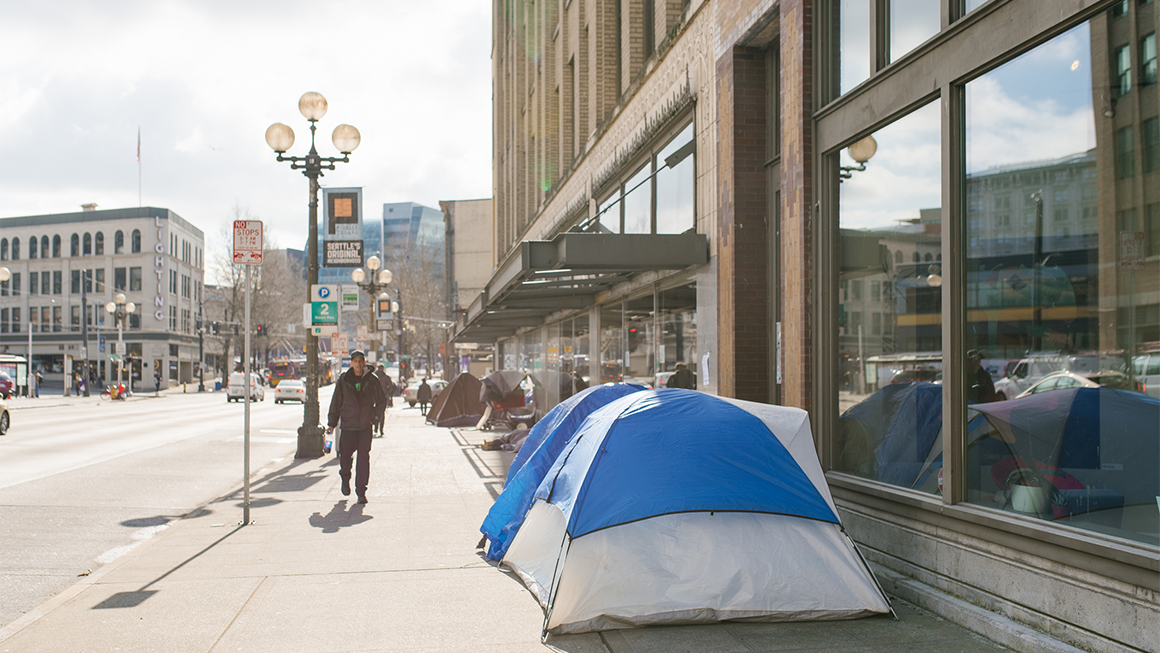
Amid a growing national homelessness crisis, the Trump administration and legislators from both parties have been more vocal about reducing the number of people living outside and increasing treatment and recovery services for those dealing with mental health and substance use challenges. The evidence shows that pairing a strong Medicaid program with affordable housing options is essential to achieving this goal.
The new budget reconciliation bill being considered by Congress, however, does not strengthen Medicaid. Instead, it adds red tape that will make Medicaid more inefficient and interrupt the health care services and treatment people experiencing homelessness need. Rather than get people off the streets and ensure they receive necessary care, this additional red tape would exacerbate the homelessness crisis.
The combination of Medicaid-covered supportive services and affordable housing has been proven to reduce homelessness, jail stays, and hospital visits
More than 10 years ago, Medicaid expansion under the Affordable Care Act enabled more access to quality health care for people experiencing homelessness. In states that expanded Medicaid, health care coverage rates among people experiencing homelessness jumped from 45 percent in 2012 to 67 percent in 2014. Over the next decade, Medicaid agencies began to offer more comprehensive and tailored services, with 31 states now authorized to cover specialized supportive services (PDF) that help people gain and sustain housing.
Communities have leveraged these Medicaid-funded services to expand supportive housing supply (PDF). This model effectively serves the most vulnerable people, many of whom have lived outside or in shelters for decades while managing a disability.
Multiple randomized controlled trials have shown that supportive housing helps people find housing and stay there for the long term. Though not all people experiencing homelessness need supportive housing, those who do are likely to remain homeless if supportive housing units aren’t available. Supportive housing disrupts the link between homelessness and frequent arrests and jail stays—especially for offenses related to being unhoused, such as trespassing or camping—refocusing law enforcement resources on violent crime and other urgent matters. It also reduces emergency department visits while increasing preventive treatment and recovery care services in a less costly outpatient setting.
These improved outcomes also mean supportive housing uses public resources more efficiently. In an Urban Institute study of a supportive housing program in Denver, about half of the total cost was offset just by cost reductions in other emergency public services, including jail, police, detoxification, and hospital services.
Supportive housing works, but nationally, there aren’t enough supportive units compared with the number of eligible people. Urban’s recent study in Colorado showed that when states have the necessary funding for housing and services, supportive housing providers can rapidly scale to meet the need. Communities have the solution if government can scale funding for what works.
The reconciliation bill would make it harder to connect people experiencing homelessness to health care, treatment, and housing
But funding for evidence-based models that connect people experiencing homelessness to treatment and recovery is at risk under the proposed reconciliation bill. Analysis by Manatt Health (PDF) and the Congressional Budget Office agree that the bill creates red tape by instituting frequent eligibility checks and new paperwork, which would threaten millions of people’s health care coverage.
These new requirements would disproportionately harm people experiencing homelessness in three ways, leaving them uninsured:
- Burdensome paperwork requirements. The bill requires many Medicaid members to meet or prove they are exempt from work requirements, as verified through information from the Internal Revenue Service and public assistance databases or through onerous paperwork. These verification processes are more challenging for people experiencing homelessness because they face barriers to accessing public benefits and are more likely to have informal and cash-based income (PDF). Though many people experiencing homelessness will likely qualify for an exemption, research on other public programs has shown that work requirements disproportionately screen out people experiencing homelessness, even when unintended.
- Proof of address and citizenship. The bill introduces new required processes for states to verify address and citizenship for Medicaid applicants and renewals. Obtaining and keeping identification is a known hardship for people experiencing homelessness, as many have limited access to technology or transportation to complete applications, no resources for application fees, and no permanent address. Further, people experiencing homelessness frequently move and have no secure place to protect their personal property from loss, theft, or destruction.
- Frequent eligibility checks. The bill requires many adults to reapply for Medicaid every six months, which would disproportionately affect stable Medicaid enrollment for people experiencing homelessness. For example, people experiencing homelessness are more likely to interact with police officers and are more likely to go to jail and stay in jail longer, most commonly for offenses like trespassing because they have no other place to go. In many states, people are disenrolled from Medicaid when incarcerated. Without efficient reenrollment processes upon release, ongoing Medicaid churn results in worse outcomes and higher costs.
The reconciliation bill would make it harder for people living outside and in shelters to access the health care and treatment they need to recover and enter stable housing. Once again, jails and hospitals would become the frontlines of a growing homelessness crisis, which could swamp already tight local and state budgets. Rather than adding more red tape, legislators should look to the evidence for interventions that help people off the streets and into the health care services they need. And the evidence is clear: Any solution to the homelessness crisis must include an efficient and effective Medicaid program.
Let’s build a future where everyone, everywhere has the opportunity and power to thrive
Urban is more determined than ever to partner with changemakers to unlock opportunities that give people across the country a fair shot at reaching their fullest potential. Invest in Urban to power this type of work.